
Morganite Gemstone: Properties, Meanings, Value & More
 Morganite is a pale peachy-pink beryl gemstone with exquisite shimmer and a rich history in the gem world. If you can’t get enough of rose gold, the morganite gemstone offers a similar hue with enough sparkle to dazzle any passerby!
Morganite is a pale peachy-pink beryl gemstone with exquisite shimmer and a rich history in the gem world. If you can’t get enough of rose gold, the morganite gemstone offers a similar hue with enough sparkle to dazzle any passerby!
You may be more familiar with morganite’s fellow beryl stones, aquamarine and emerald, but this gemstone’s popularity has steadily risen since 2010. Despite its official discovery in 1910, the commercial jewelry market only started to recognize morganite around 2010. Talk about a one-hundred-year slow burn!
Since gaining wider recognition, morganite has taken the market by storm. One 2017 engagement ring study from The Knot showed that morganite engagement ring gemstones were the second most popular non-diamond choice, only preceded by sapphire.
What makes this romantic gem worthy of a double take? Today, we’ll share the 411 on morganite crystal properties, value, symbolism, and more!
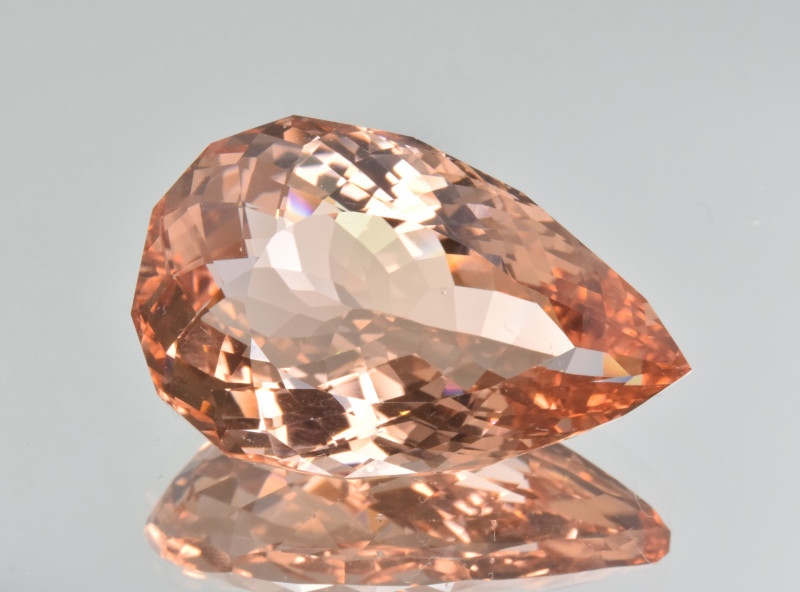
About Morganite Stone
Firstly, is morganite a real gemstone? Absolutely! Morganite is a semi-precious gemstone mostly sold in two shades: peach with a coppery undertone or soft, ballerina pink.
Alternate trade names include “pink beryl,” “rose beryl,” and “pink emerald.” The Federal Trade Commission doesn’t recognize “pink emerald” as a legal trade name, but there’s some history tied to it that we’ll cover later!
Morganite is a zodiac stone for Libra, lovingly encouraging Libra’s focus on balance and relationships. Morganite isn’t a birthstone, but those born in November can wear it as a lovely form of their alternate birthstone, beryl!
Beryl is the traditional 38th wedding anniversary gemstone. This anniversary is the perfect time to celebrate by gifting your partner some morganite earrings!
Mineral Characteristics
Morganite minerals are composed of beryllium, silicon, oxygen, and aluminum, though other elements like manganese, caesium, iron, and lithium are commonly present.
There’s a bit of debate over the source of morganite’s color (the “chromophore” element) being manganese or caesium. Gemological Institute of America (GIA) research from 1955 and 1981 confirmed that caesium is not a beryl chromophore (color-causing element). But, morganite often contains both elements with manganese as the true coloring agent.
Morganite is the second-rarest variety in the beryl family, after Utah’s red beryl, bixbite. Color-wise, rarer deep pink morganite specimens may resemble pezzottaite, but morganite has a lower refractive index, specific gravity, and manganese content.
A 7.5-8 on the Mohs mineral hardness scale, morganite is durable and great for everyday wear.
On that note, check out all of the morganite properties below!

Morganite Specifications & Characteristics
Color: Most often pink or salmon; May be orange or yellow; Rarely magenta
Crystal structure: Hexagonal
Luster: Vitreous (glass-like)
Transparency: Translucent to transparent
Refractive index: 1.57-1.60
Density: 2.71-2.90
Cleavage: Imperfect, parallel to the basal pinacoid [0001]
Fracture: Conchoidal to uneven
Streak: White
Luminescence: Fluorescence, inert to weak; Intense red under X-rays, Apricot under UV-Long
Pleochroism: Present and distinct in pale pink to deep bluish-pink
With mineralogy covered, what is the spiritual meaning of morganite?
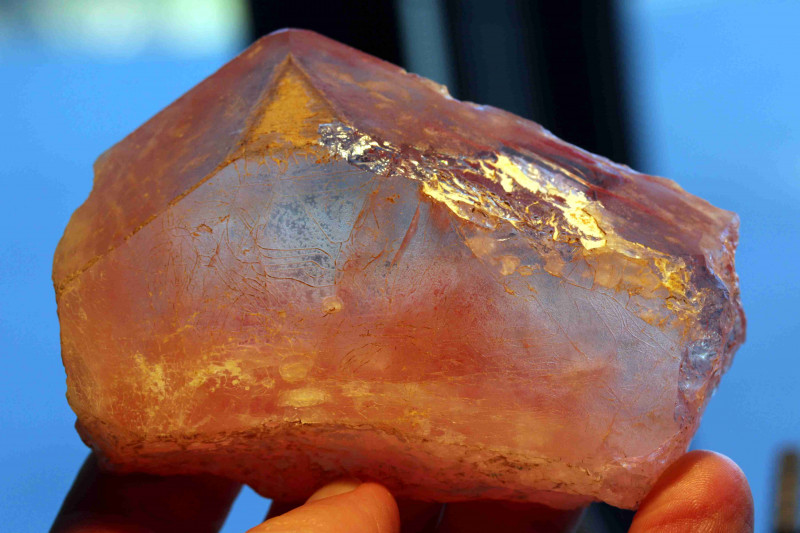
Morganite Meaning
For a long time, morganite simply went by “pink beryl.” Morganite’s name came in 1911, suggested by Tiffany gemologist George Frederick Kunz. Kunz chose it to honor his American financier J.P. Morgan.
Spiritually, the peach morganite crystal meaning represents healing, love, and inner peace. Nicknamed the “Stone of Divine Love,” the soft pink crystal is often tied to self-assurance, patience, and empathy.
Another nickname for morganite is the “Stone of Equality and Acceptance,” reflecting its further symbolism in fairness, just treatment, and overcoming adversity.
Paired with beryl’s symbolism in faithful love and respect, the pink morganite meaning is particularly powerful for those in long-term relationships. It represents the patience, compassion, and promise required to make love last.
Morganite connects the heart and spirit in healing circles, relieving the shame of emotional wounds and building up confidence in your heart’s strength to love again.
Elaborating on that, what is morganite crystal used for?
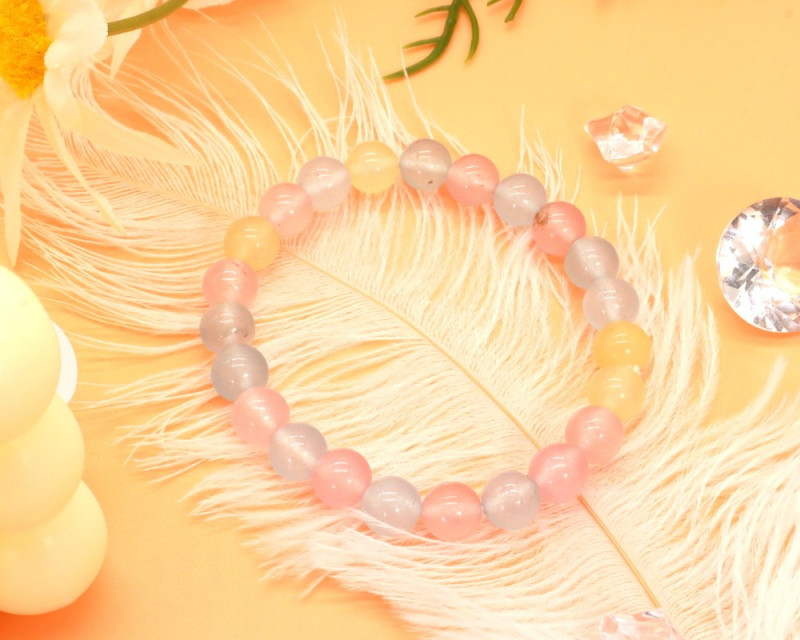
Morganite Healing Properties
All gems have spiritual vibrations that make them useful healing stones. Is morganite a healing stone? Yes!
Morganite, along with other pink gemstones, inherently nurtures unconditional love, acceptance, and heart-healing.
Generally, morganite stone benefits can encourage teamwork, communication, and relaxation. In addition, morganite offers specific healing powers in physical, emotional, and chakra healing!
Physical Healing
Physical morganite healing properties may support the heart, lungs, and circulatory system. The stone is purported to help anyone struggling with stress-induced illnesses.
Additionally, some say morganite crystal benefits include getting oxygen to blood cells, eliminating vertigo, and helping reduce asthma symptoms.
Emotional Healing
Individual emotional healing properties for morganite can help cleanse the heart of deep-rooted pain, reduce anxiety, and encourage self-compassion.
In relationships, morganite reportedly helps you identify your needs, express them honestly with love, and move forward without bitterness. Wearing a morganite necklace can support you as you overcome pain or anger, allowing you to grow from difficult experiences.
Chakra Healing
Is there a morganite chakra connection? Yep! Chakra healing involves balancing one or more of your chakras, seven energy centers that correspond to different physical and emotional symptoms.
Perhaps unsurprisingly, morganite opens the heart chakra! The heart chakra governs love, spirituality, and the balance of masculine and feminine. Feelings of worthlessness, apathy, or isolation are signs of a blocked heart chakra. Once morganite opens it, you can love yourself and others freely without restraint.
In love with morganite yet? Before choosing one for yourself, it’s best to know what quality factors to look for.
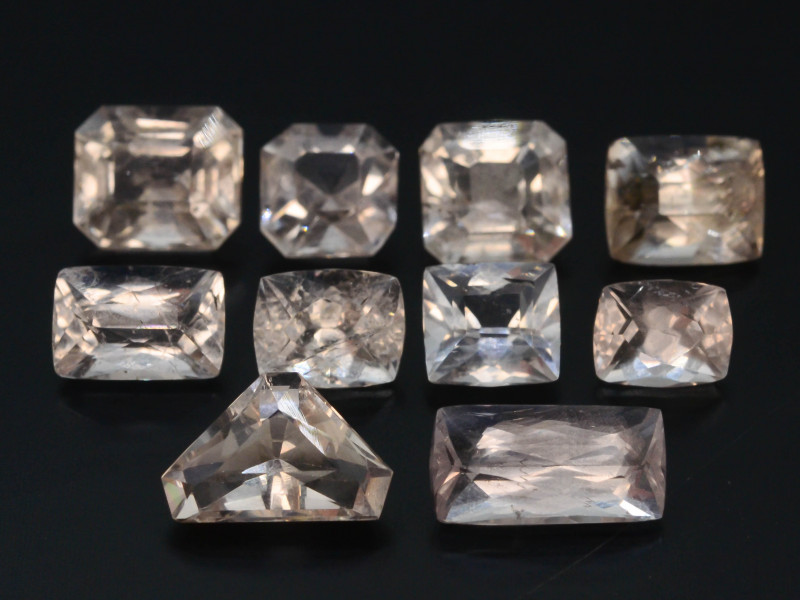
Morganite Gemstone Properties
Experts look at a gemstone’s properties to determine its objective value. Morganite’s primary factors are color, cut, clarity, carat weight, and treatments.

Color
Morganite’s parent stone, beryl, is allochromatic, meaning its pure form is colorless. And color comes from the presence of other elements during the stone’s formation. Morganite pink comes from traces of manganese, while iron gives a yellow hue to form the orangey-pink stones.
While morganite is mostly known for its pale, subtle hue, more saturated pinks are rare and command higher prices. Raw morganite can also display color-banding.

Cut
Morganite crystals have the brilliance and durability for virtually any faceted cut, including standard and fancy designer shapes. But, the lapidarist (gem-cutter) must choose the right orientation to properly show off the stone’s pleochroism.
Paler morganite rough may require deeper cutting to get a stronger, more visible color. On the rare occasion that a morganite stone is less transparent and more cloudy, it may become a cabochon, carving, or string of morganite stone beads.
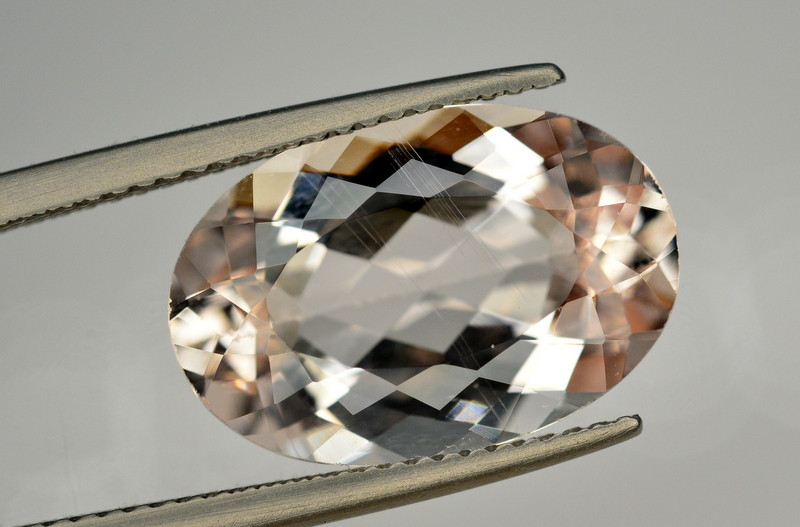
Clarity
Morganite’s clarity, defined as the amount and visibility of inclusions in a gemstone, has a Type I colored gemstone clarity grade. You can expect Type I gemstones, particularly faceted pieces, to be eye-clean, meaning there are no visible inclusions.
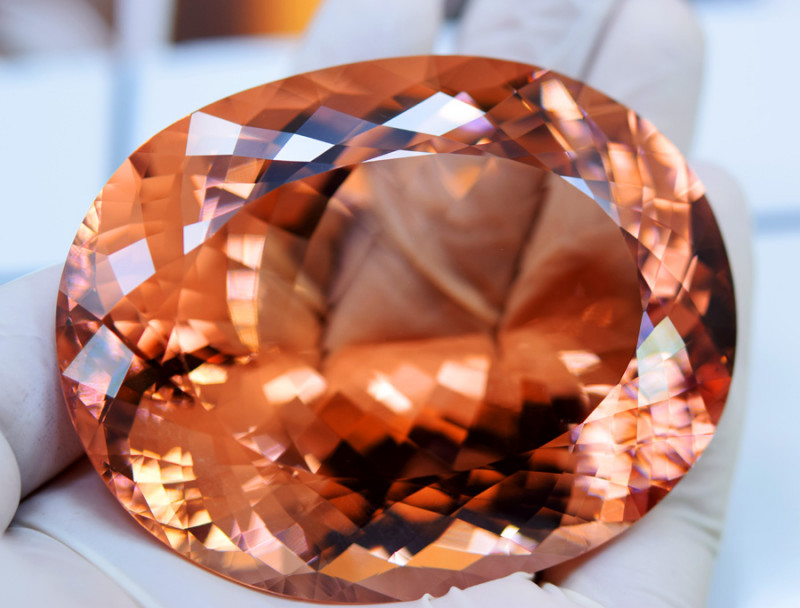
Carat Weight
Despite its relative rarity among beryl gems, morganite crystal grows in large sizes, and you’ll see many large faceted morganite stones. In fact, Brazil produces over 10kg (22lbs) of morganite crystals!
Larger morganite specimens show the finest coloring, along with better brilliance. For reference, brilliance is a gemstone faceting term for how much light reflects from the gem’s interior.
Treatments
Treated gemstones are typically less valuable than untreated gemstones, but morganite may undergo two standard treatments that usually don’t bring down its value: heat and irradiation.
Heat treatments remove the yellow hues from peach morganite stones, leaving a brighter pink hue. The new pink color is stable and fade-resistant. Sometimes, jewelers will irradiate colorless beryl (goshenite) to create a pink color emulating morganite.
Now that you know what to look for, let’s look at the juicy details behind morganite’s history!
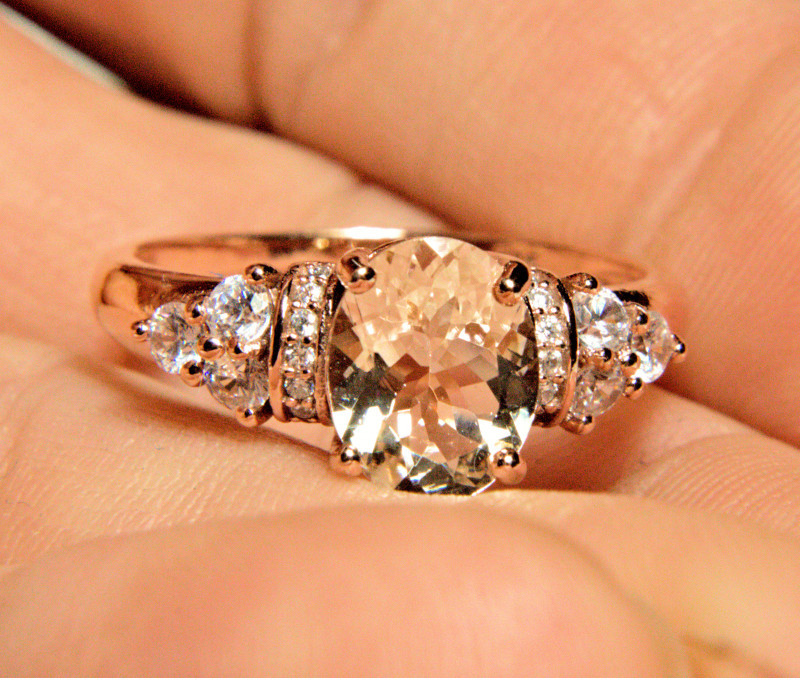
Morganite History
The first unofficial morganite discovery was in Pala, California, USA in 1908. Two years later, George Frederick Kunz, acclaimed Tiffany gemologist, made the first official morganite discovery near Madagascar.
At a New York Academy of Sciences meeting in December 1910, Kunz suggested the name “morganite” to honor his friend and business partner, American financier J.P. Morgan.
Morgan donated money to arts and sciences, and donated gems to New York and Paris museums. In the early 1900s, Morgan had significant gemstone collections curated by Kunz and Tiffany & Co, including over 1,000 American gemstones. Kunz helped build Morgan’s collections, one of which was featured at the 1889 World’s Fair in Paris!
In 1989, brothers Dennis and Ron Holden mined one of the biggest morganites in the world. They found the peachy, 50-lb (23kg) crystal in a quarry in Maine, USA, and the stone earned the moniker “The Rose of Maine.” Today, the largest faceted morganite lives in the British Museum, a 600-ct. piece from Madagascar.
Remember how we mentioned the history behind the name “pink emerald” earlier? Well, gem traders went back and forth about different beryl gem names. Then, the cover story title of National Jeweler Magazine in June 1994 read: “Morganite: It’s Pink Emerald Now.”
Eleven years later, the Sotheby International auction house sold an Islamic morganite prayer bead under the name “pink emerald.” This sale marked the first time a reputable auction house used this name instead of “morganite.”
Whether it’s “pink emerald” or “morganite,” it forms the same way. So, how does morganite form?

Morganite Origins & Sources
Most morganite specimens crystallize in complex granitic pegmatites, which form when magma cools and water solidifies into surrounding rocks. You can also find morganites in alluvial deposits (where flowing water deposited material in a new place).
Aquamarine often forms alongside morganite, sometimes merging to create a layered, bi-colored specimen. Some mineralogists think that morganites and pezzottaites colored by manganese get their pink hue from exposure to natural irradiation after their crystallization.
After the stone crystallizes, where do miners uncover morganite?
Mining Locations
Most morganite comes from Brazil’s Minas Geras mines. The highest-quality specimens usually come from Brazil or Madagascar, with the latter often setting the standard for quality, especially magenta-colored specimens.
Other morganite sources include:
Afghanistan
Australia
China
France
Mozambique
Myanmar
Pakistan
Russia
Sri Lanka
Thailand
USA (California & Maine)
Zimbabwe
Given its many sources, is morganite a valuable gem?

Morganite Gemstone Price & Value
The key morganite value factors are clarity and color, though these can be affected by carat weight and treatments. The highest-valued morganite stones have deep pink coloring, flawless clarity, and a large enough size to display excellent brilliance.
How much does a 1-carat morganite cost? A 1-carat morganite will usually cost between $100-$300, but factors like brand, store, cut, and type of metal used can affect the price of morganite jewelry. Larger stones, like 2.5-4-ct sizes, may cost between $800-$1,800.
In terms of rings, many newlyweds may debate on morganite vs. diamond. Many pros and cons of morganite come from this comparison, as the labor ethics and high prices tied to diamonds may push buyers toward morganite.
The “Millennial Pink” trend from 2017 seduced blushing brides, craving all the romantic vibes, toward pink engagement stones. For instance, Ben Affleck’s pink diamond engagement ring for Jennifer Lopez was worth $2.5 million, while the same-sized morganite ring would run around $1,800.
Morganite’s prices mean you’ll want your stone to last. So, how do you care for morganite?
Morganite Care and Maintenance
To clean morganite, we recommend mild soap, warm water, and a soft brush. Rinse the stone well and wipe with a microfiber cloth.
Morganite’s excellent durability means you can safely wear morganite jewelry daily and keep it sparkling with simple care.
Keep your morganite away from:
Harsh chemicals
Harder stones (diamond, sapphire, ruby, topaz)
High heat
Some peach morganites can shift to pinker hues in sunlight, so be aware before wearing peach morganite jewelry outside.
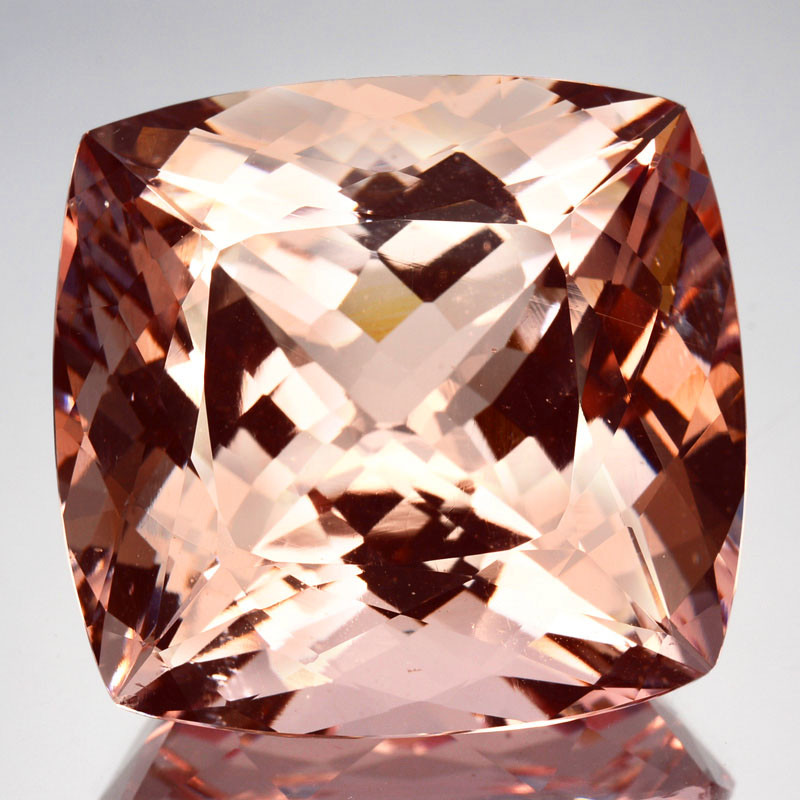
Are You Mesmerized by Morganite?
After its discovery, it took a century for the public to recognize morganite’s beauty, but the stone’s popularity has since steadily increased. While Morganite may not have been the prom queen in high school, she is thriving in her prime now! Since aquamarine and emerald are still better-known, there’s no better time to get a deal on a morganite crystal for sale!
Whether it’s a decorative morganite crystal or morganite bracelet, this romantic stone’s soothing vibrations will instantly warm your heart.
Search the Gemstone Encyclopedia
Related Auctions
Related Articles
Originally the Birthstones or gemstones were associated with a zodiac sign or the month of a individuals birth. Find out what your stone is and view the stones we have for sale
8th Feb 2021
There are dozens of quartz and chalcedony gems with various colors and patterns. Learn all about quartz properties and every type of quartz, from amethyst and agate to plasma and phantom quartz!
15th Oct 2020
Hackmanite is a pink to violet sodalite gem known for its unique color-change and luminescence. Learn why hackmanite is special, from its rare qualities to the types of hackmanite jewelry available.
28th Mar 2018
Latest Articles
Tantalite is a group of red, brown, or black minerals containing the rare and valuable element tantalum. Discover the uses, history, prices, and properties of tantalite gemstones in this guide!
11th Nov 2024
Hodgkinsonite is a very rare collector’s gemstone known for its vibrant pink or purple hues, only found in New Jersey, USA. Learn hodgkinsonite’s prices, history, properties, and traits in this guide!
9th Jun 2024
Canasite is a rare mineral usually found as greenish-yellow inclusions in charoite but also known as a purple gemstone. Learn canasite’s history, varieties, properties, and prices in this guide.
27th May 2024
Article Categories
How To's is where you will find helpful articles from gem Rock Auctions on how to cut gemstones, select gemstones and buy gemstones.
9 Articles





